Related Research Articles

George Richard Chamberlain is an American actor and singer, who became a teen idol in the title role of the television show Dr. Kildare (1961–1966). He subsequently appeared in several miniseries, such as Shōgun (1980) and The Thorn Birds (1983) and was the first to play Jason Bourne in the 1988 television film The Bourne Identity. Chamberlain has also performed classical stage roles and worked in musical theatre.
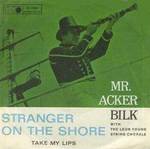
"Stranger on the Shore" is a piece for clarinet written by Acker Bilk for his young daughter and originally named "Jenny" after her. The tune was written on a single scrap of paper by Bilk and handed over to Leon Young (1916-1991) who crafted the string arrangement, including the characteristic harmonic shifts at the very end.
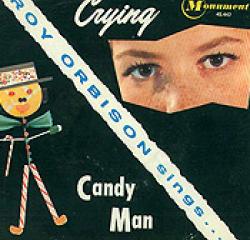
"Crying" is a song written by Roy Orbison and Joe Melson for Orbison's third studio album of the same name (1962). Released in 1961, it was a number 2 hit in the US for Orbison and was covered in 1978 by Don McLean, whose version went to number 1 in the UK in 1980.
"Mambo No. 5" is an instrumental mambo and jazz dance song originally composed and recorded by Cuban musician Dámaso Pérez Prado in 1949 and released the next year.

"True Love" is a popular song written by American songwriter Cole Porter, published in 1956. The song was introduced by Bing Crosby and Grace Kelly in the musical film High Society. "True Love" was nominated for the Academy Award for Best Original Song. Kelly's contribution on the record is relatively minor, duetting with Crosby on only the final chorus. Nonetheless, the single is co-credited to her.

"Ramblin' Rose" is a 1962 popular torch song written by brothers Noel Sherman (words) and Joe Sherman (music) and popularized by Nat King Cole. The recording by Nat King Cole reached No. 2 on the Billboard Hot 100 chart in 1962.

"Nobody Does It Better" is a power ballad and the theme song for the James Bond film The Spy Who Loved Me (1977). Composed by Marvin Hamlisch with lyrics by Carole Bayer Sager, the song was produced by Richard Perry and performed by Carly Simon. It was the first Bond theme song to be titled differently from the name of the film since Dr. No (1962), although the phrase "the spy who loved me" is included in the lyrics. The song was released as a single from the film's soundtrack album, and became a major worldwide hit.

"(They Long to Be) Close to You" is a song written by Burt Bacharach and Hal David. The best-known version is that recorded by American duo the Carpenters for their second studio album Close to You (1970) and produced by Jack Daugherty. Released on May 14, 1970, the single topped both the US Billboard Hot 100 and Adult Contemporary charts. It also reached the top of the Canadian and Australian charts and peaked at number six on the charts of both the UK and Ireland. The record was certified gold by the Recording Industry Association of America (RIAA) in August 1970.
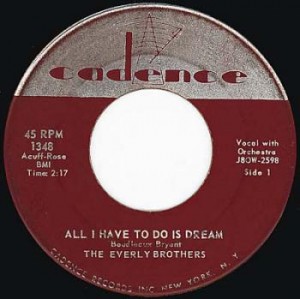
"All I Have to Do Is Dream" is a song made famous by the Everly Brothers, written by Boudleaux Bryant of the husband-and-wife songwriting team Felice and Boudleaux Bryant, and published in 1958. The song is ranked No. 141 on the Rolling Stone magazine's list of The 500 Greatest Songs of All Time. The song is in AABA form.
"Theme from A Summer Place" is a song with lyrics by Mack Discant and music by Max Steiner, written for the 1959 film A Summer Place, which starred Sandra Dee and Troy Donahue. It was recorded for the film as an instrumental by Hugo Winterhalter. Originally known as the "Molly and Johnny Theme", this lush extended cue, as orchestrated by Murray Cutter, is not the main title theme of the film, but an oft-heard secondary love theme for the characters played by Dee and Donahue. The theme has become a canonical representation of the easy listening genre, and is considered by some to be the definitive easy listening track of all time.
"Love Hurts" is a song written and composed by the American songwriter Boudleaux Bryant. First recorded by the Everly Brothers in July 1960, the song is most well known from the 1974 international hit version by Scottish hard rock band Nazareth and 1975 Top 5 hit in the UK by English singer Jim Capaldi.

"Disco Lady" is a 1976 single by American singer Johnnie Taylor that went on to become his biggest hit. It spent all four weeks of April 1976 at No. 1 on the Billboard Hot 100 and six weeks atop the Billboard R&B chart in the U.S. It was also the first single to be certified platinum by the RIAA; ultimately it sold over 2.5 million copies. Billboard ranked it as the No. 3 song for 1976; Cash Box had it the year's No. 1 song

"Rockin' Robin" is a song written by Leon René under the pseudonym Jimmie Thomas, and recorded by Bobby Day in 1958. It was Day's biggest hit single, becoming a number two hit on the Billboard Hot 100, and spent one week at the top of the R&B sales chart. Michael Jackson recorded his own version of the song in 1972, which also achieved success.

"Heartbeat" is a rockabilly song originally recorded by Bob Montgomery and credited to Norman Petty. It was recorded most famously by Buddy Holly in 1958. The B-side of the single was "Well... All Right". "Heartbeat" reached the UK top 10 twice: once in 1975 for Showaddywaddy at number seven and again in 1992 for Nick Berry, recorded as the theme to the television series Heartbeat, which reached number two.
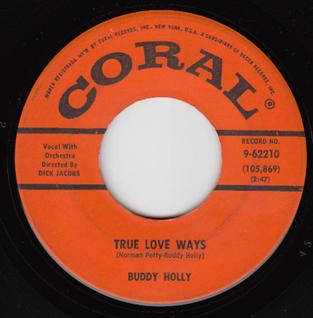
"True Love Ways" is a song attributed to Norman Petty and Buddy Holly. Buddy Holly's original was recorded with the Dick Jacobs Orchestra in October 1958, four months before the singer's death. It was first released on the posthumous album The Buddy Holly Story, Vol. 2, in March 1960. The song was first released as a single in Britain in May 1960, reaching number 25 on the UK Singles Chart. It was released the following month in the US, but did not make the charts. In 1988, a UK re-release of the recording by MCA, the single reached no. 65 on the UK singles chart in a 5 week chart run.
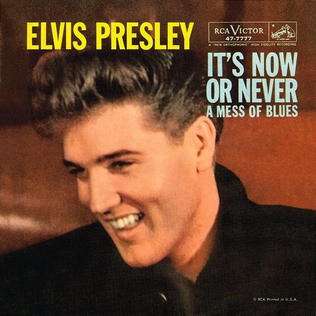
"It's Now or Never" is a song recorded by Elvis Presley and released as a single in 1960. The song is one of the best-selling singles by Presley, and one of the best-selling physical singles of all time. It was recorded by Bill Porter at RCA Studio B in Nashville. It is written in E major and has a tempo of 80 BPM.

"Roses Are Red (My Love)" is a popular song composed by Al Byron and Paul Evans. It was recorded by Bobby Vinton, backed by Robert Mersey and his Orchestra, in New York City in February 1962, and released in April 1962, and the song was his first hit.

"Always and Forever" is an R&B song written by Rod Temperton and produced by Barry Blue. It was first recorded by the British-based multinational funk-disco band Heatwave in 1976. Released as a single on December 3, 1977, the song is included on Heatwave's debut album Too Hot to Handle (1976) and has been covered by numerous artists, becoming something of a standard.

"Good Feeling" is a song by American rapper Flo Rida from his 2012 EP of the same name, also appearing on his fourth studio album, Wild Ones. It was released as the album's lead single on August 29, 2011, in the United States. The song was written by Flo Rida, Dr. Luke, Cirkut, Breyan Isaac, Arash Pournouri, Avicii, Etta James, Leroy Kirkland and Pearl Woods. It was also produced by Dr. Luke and Cirkut.
"Peace in Our Time" is a song written by English songwriters Andy Hill and Peter Sinfield, first recorded by American actress Jennifer Holliday for the 1988 Summer Olympics album One Moment in Time. The song was later covered by American rock singer Eddie Money and English singer Cliff Richard.
References
- ↑ Catalog of Copyright Entries: Third series. 1963. p. 1556 – via Library of Congress. Copyright Office.
- 1 2 "Billboard Hot 100". Billboard. 11 August 1962.
- 1 2 "Richard Chamberlain: Artist Chart History". Official Charts Company.
- ↑ "CHUM Hit Parade, week of July 2, 1962".
- ↑ "Billboard Easy Listening". Billboard. 11 August 1962. p. 44.
- ↑ "Cash Box Top 100 Singles, August 4, 1962".
- ↑ "Johnnie Spence". The Official Charts Company.